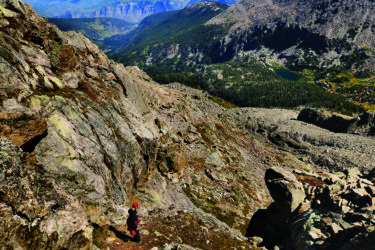The Local newsletter is your free, daily guide to life in Colorado. For locals, by locals.
These days, Red Gerard is one of the most famous snowboarders in the world. But when he became the world’s youngest Olympic snowboard champ during the 2018 Pyeongchang Games at the age of 17, few knew the baby-faced shredder with the mop of strawberry-blonde hair.
Gerard admits the success—and the name recognition that came with it—forced him to mature a bit quicker than expected, but he is still just as creative as ever on a snowboard. “He’s an individual,” says David Reynolds, head coach for slopestyle and big air for the U.S. Snowboarding team. “He really wants to do things his way. He wants to be unique.” Reynolds believes that independent approach will lead the 21-year-old phenom to victory in a run of events this winter, including the Visa Big Air Olympic qualifying competition this weekend at Steamboat Ski Resort, the Dew Tour (December 15 to 19) at Copper Mountain, and the Winter Olympics in Beijing this February.

Ahead of this winter’s competitions, Gerard has been dialing in his tricks at Copper Mountain’s Woodward facility and training at international camps. He has also spent plenty of time in his family’s backyard in Silverthorne, where he, along with his six siblings and friends, have whiled away winter days hitting homemade rails and jumps since 2012, when his family moved to the home.
“I’ve been back on snow getting back into the rounds,” Gerard said earlier this year, shortly after returning from a training camp in Switzerland during which he witnessed numerous international athletes already pulling out their biggest tricks. “It was incredible. We had great conditions. It was the most insane and wildest progressions I’ve ever seen.”
When Gerard won gold in the slopestyle event in 2018—only the second iteration for Olympic slopestyle following its debut in the 2014 Sochi Winter Games—he threw down a miraculous final run, which vaulted him from last place to first. His winning effort included a series of challenging slides and spins on the rails followed by an extremely technical combination of rotations, including a 1440 spin. At the time, the 1440 (four complete rotations) was the biggest spin male snowboarders threw in competition.
Now, Gerard is working on a couple of stylish and complex 1620s, even throwing in a few 1800s at the European training camps he attended this past fall. “Last season, a 1620 was the big trick,” Reynolds says. “Only four or five guys could do an 1800. Now, there’s 10 or 12 guys, maybe more, who can do it.”
Reynolds, who has been coaching Gerard for about eight years, believes the snowboarding star’s secret weapon is all the practice he’s gotten in more casual settings, along with the ample time he’s spent in the backcountry—including helicopter rides to isolated mountain tops—the past few years. He’s even skipped some major events to hit big powder lines, build jumps, and ride with his friends.
The varied approach may be the key to defending his Olympic gold in Beijing. “In slopestyle, each course is unique. It’s not like halfpipe, which is pretty precise and athletes always know what they’re going to do. In slopestyle, you have to figure out a new course every time,” Reynolds says. “Are there two jumps? Three jumps? Four jumps? I think that’s what Red likes about it, how creative and how versatile you have to be.”
One thing Reynolds knows for sure is that Gerard’s laid-back attitude will be the same, whether he is competing at the Dew Tour or the Olympics. “For us, it has to be no big deal,” Reynolds says. “It’s the way our sport works. We go to these camps and learn more tricks, but every competition comes down to: What’s today like? Is there wind? Is there new snow? The Olympics are the same. It’s just another Saturday.”








